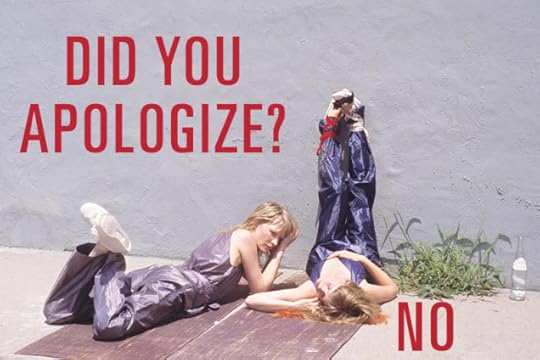A Week Without Sorry

I’ve always had a problem over-apologizing. At my first paid job at a talent agency, I apologized constantly for things outside of my control, assuming a more experienced assistant could have managed to get that exclusive reservation or forced that writer to send in their signed contract. Finally, when I was in the middle of apologizing for another minor error I hadn’t caused, my boss interrupted me.
“Stop. Stop apologizing for things that aren’t your fault,” he said. “Otherwise, you’ll just make people think everything’s your fault. And it’s not. Only a lot of it is. Okay?”
“Sorry,” I said, and he threw up his hands, defeated.
In Sloane Crosley’s “Why Women Apologize and Should Stop,” the author views effusive female apologies as a “Trojan horse for genuine annoyance,” a sort of verbal tic left over from centuries of women having to dress up a request in pretty, digestible language to get what they want. Crosley thinks this is a behavior we need to ban, that “it comes off as passive-aggressive,” and we’re better off without excessive apologies.
Per her article’s advice, I decided to get rid of “sorry” for one week, but found it difficult to shake. Instead of using “sorry,” I found myself filling its place with a thousand other placating tics — throwing the word “just” in every single sentence (“Hey! Just wondering if you could just maybe send me the correct number?”); saturating my emails with a dramatic number of exclamation marks (“Would love to get this mtg set!!!!!!!!!”); smiling maniacally.
The uncomfortable, apology-free week made me realize that my tendency toward over-apologizing comes from a place not of passive aggression, but of wanting to be liked. Instead of banning sorry, perhaps what I needed to rid myself of was an inherent need to please — which is easier said than done.
We still live in a world where powerful, demanding female executives are referred to as “crazy” or “bitchy.” It makes sense that women feel the need to consciously cloak their “fuck yous” in a sorry, the way Crosley describes. There’s still the concern that if we push too hard, we might be rejected, that if we don’t seem likable, we won’t get anywhere. Being humbly apologetic can be a necessary, useful business tactic — so is it my responsibility to remove sorry from my vocabulary, or society’s responsibility to stop defining the word as weak?
Ann Friedman believes it’s up to society to change the sorry game and wrote a story that followed Crosley’s, aptly titled, “Can We Just, Like, Get Over the Way Women Talk?” She believes women shouldn’t be forced to “question [their] voice.” If all women were to change their speech patterns to fit a prescribed, “powerful” norm, our cadence “would lose the casual, friendly tone we wanted it to have and its special feeling of intimacy…it wouldn’t be ours anymore.”
But I disagree. While I think that the ability to be kind and relatable is just as powerful a negotiating tool as brisk authority, I still maintain that my first boss was right: that to be taken seriously, one must speak with certainty and clarity, two things that throwaway words like “sorry” can undermine.
To suggest that we all stop apologizing entirely or disregard the notion of being kind and polite is not the answer, but neither is allowing ourselves to fall back on nervous tics. Rather, it’s remembering that the desire to seem “nice” shouldn’t preclude our ability to do our jobs in an efficient, self-assured manner, and that being confident is never something to be sorry for.
Photograph by Mark Borthwick for Purple Magazine Fall 2012
The post A Week Without Sorry appeared first on Man Repeller.
Leandra Medine's Blog
- Leandra Medine's profile
- 75 followers




